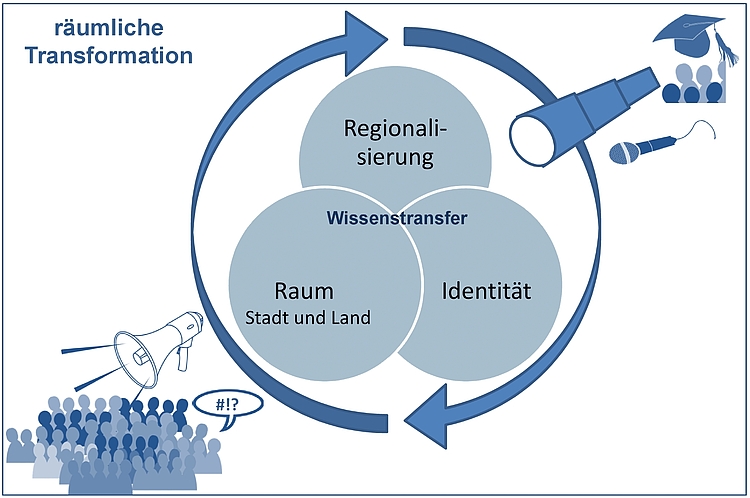Future Discourse: Understanding and Using Spatial Identities - An Opportunity for Future-Oriented Regions

| Led by: | Dr. Daniela Kempa |
| Team: | IUP: Dr. Daniela Kempa, ARL (Academy for Territorial Development in the Leibniz Association): Dr. Sebastian Krätzig, Dr. Barbara Warner |
| Year: | 2020 |
| Date: | 18-02-19 |
| Funding: | Funded by the Niedersächsischen Vorab durch das Niedersächsische Ministerium für Wissenschaft und Kultur (Lower Saxony Ministry of Research and Culture) |
| Duration: | May 2019 - April 2020 |
Documentation and Results of the Future Discourse
Click here for the results and products of the discourse
Milestone 1: Kick-off event
Milestone 2: Stakeholder workshop
Milestone 3: Public closing event
Background and Goals
With a transformation towards sustainability and a stronger regionalization, regions try to meet the profound changes and social, ecological and economic challenges and to become sustainable. New cooperations, e.g., in questions of infrastructure (traffic, culture), but also the highlighting of unique selling points characterizes the new self-image of regions.
At the same time, a debate is taking place in science and society about citizens identifying with their region, which is sometimes discussed as an attachment to the homeland and then again as a spatial identity or place attachment. Behind this identification is usually the perceived "uniqueness" of a region, which on the one hand, is connected on an individual level with feelings of personal belonging and associated elements, images and stories. On the other hand, it also often consists of a consensus among the inhabitants about this peculiarity.
The advantage for regions: If you know the spatial identities of a region, you can use them specifically to initiate and steer a broad debate about the region's future direction based on the inhabitants' emotional attachment. This way, identity-relevant elements, uses and practices can be incorporated to uncover new perspectives and development paths. Thus, a common internal image of the region can be developed that is shared by the inhabitants and communicated to the outside world.
In a future discourse, the topics of spatial identities and regionalization or regional development are to be discussed to make spatial identities usable for change processes in regions. The planned discourse will attempt to bring the knowledge about this interplay gathered in a research project into a broader scientific and social debate.
Project participants
The project is being carried out in cooperation with the Academy for Spatial Development in the Leibniz Association (ARL) and the Leibniz Research Center TRUST.
Regarding content, the discourse on the future is closely linked to the BMBF project Regiobranding: www.regiobranding.de.
Publications
Kempa, Daniela; Krätzig, Sebastian & Schneider, Carolin (2019): Zukunftsdiskurs Raumbezogene Identitäten verstehen und nutzen - Eine Chance für zukunftsorientierte Regionen. In: Nachrichten der ARL 02/2019, Thema: Ländliche Räume, Akademie für Raumforschung und Landesplanung, Hannover.
Kempa, Daniela & Krätzig, Sebastian (2020): Ziele, Herausforderungen und Ansätze für eine Verknüpfung von Identitätsbildung und Regionalisierung. Zukunftsdiskurs Raumbezogene Identitäten verstehen und nutzen – Eine Chance für zukunftsorientierte Regionen, Arbeitspapier Nr. 1, DOI 10.15488/9860
Krätzig, S.; Schneider, C. & Kempa, D. (2020): Blitzumfrage „Identifikation und Heimat: Raumbezüge, Merkmale und Bedeutung für Politik, Wirtschaft und Gesellschaft“, Arbeitspapier Nr. 2, Hannover. https://doi.org/10.15488/9980
Kempa, D.; Krätzig, S.; Warner, B. et al. (2020): Understanding and using spatial identities - An opportunity for future-oriented regions. Spatial Research and Planning, in preparation.





